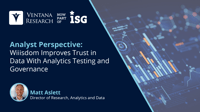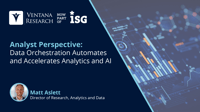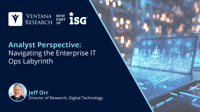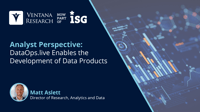The emergence of generative artificial intelligence (GenAI) has significant implications at all levels of the technology stack, not least analytics and data products, which serve to support the development, training and deployment of GenAI models, and also stand to benefit from the advances in automation enabled by GenAI. The intersection of analytics and data and GenAI was a significant focus of the recent Google Cloud Next ’24 event. My colleague David Menninger has already outlined the key...
Read More
Topics:
Analytics,
AI,
natural language processing,
data platforms,
Generative AI,
AI and Machine Learning
I recently wrote about the development, testing and deployment of data pipelines as a fundamental accelerator of data-driven strategies as well as the importance of data orchestration to accelerate analytics and artificial intelligence. As I explained in the recent Data Observability Buyers Guide, data observability software is also a critical aspect of data-driven decision-making. Data observability addresses one of the most significant impediments to generating value from data by providing an...
Read More
Topics:
Analytics,
data operations,
Analytics & Data,
Generative AI,
AI and Machine Learning,
Machine Learning Operations
Oracle held an industry analyst summit recently where the focus was on artificial intelligence (AI) and embedded AI. At the event, Oracle demonstrated progress in adding useful AI-enabled capabilities to its business applications, especially in finance and accounting, supply chain, HR and revenue management. To put this into context, across the software industry, AI is already at work in many finance-focused applications that are currently available, albeit often in limited release. We are in...
Read More
Topics:
Office of Finance,
Analytics,
Business Planning,
ERP and Continuous Accounting,
digital finance,
Generative AI,
AI and Machine Learning,
Procure-to-Pay,
Order-to-Cash,
Consolidate and Close Management
I previously wrote about the potential for rapid adoption of the data lakehouse concept as enterprises combined the benefits of data lakes based on low-cost cloud object storage with the structured data processing functionality normally associated with data warehousing. By layering support for table formats, metadata management and transactional updates and deletes as well as query engine and data orchestration functionality on top of low-cost storage of both structured and unstructured data,...
Read More
Topics:
Analytics,
data platforms,
Analytics & Data
We’re quickly approaching the moment when it becomes clear that artificial intelligence (AI) and generative AI (GenAI) will not be free. As that happens, we will discover who’s willing to pay how much and for what. After nearly 18 months of unlimited use-case fantasizing, it should be obvious that not all the potential applications of AI can be realized over the next three to five years because they fail a cost/benefit test. In theory, AI’s potential is almost limitless, but so far, little...
Read More
Topics:
Office of Finance,
Analytics,
Business Planning,
ERP and Continuous Accounting,
digital finance,
Generative AI,
Procure-to-Pay,
Order-to-Cash,
Consolidate and Close Management
Many organizations have adopted DataOps to apply agile development, DevOps and lean manufacturing processes to the development, testing, deployment and orchestration of data integration and processing pipelines. The most likely ultimate outcome of these pipelines is the analytics reports and dashboards enterprises rely on to make business decisions.
Read More
Topics:
Analytics,
Analytics & Data,
Data Intelligence
Analytics software is used by business analysts and decision-makers to facilitate the generation of insights from data. It encompasses business intelligence and decision intelligence software, including reports and dashboards as well as embedded analytics and the development of intelligent applications infused with the results of analytic processes. Analytics software enables enterprises to improve business outcomes by operating more efficiently, accelerating product development and enhancing...
Read More
Topics:
Analytics,
AI,
Analytics & Data,
Generative AI
I recently wrote about the development, testing and deployment of data pipelines as a fundamental accelerator of data-driven strategies. As I explained in the 2023 Data Orchestration Buyers Guide, today’s analytics environments require agile data pipelines that can traverse multiple data-processing locations and evolve with business needs.
Read More
Topics:
Analytics,
data operations,
data platforms,
Analytics & Data,
Generative AI,
AI and Machine Learning,
Data Intelligence
Enterprises are increasingly recognizing the need to streamline operations for efficiency, agility and innovation. This has led to various “operations” or “Ops” initiatives, each focusing on a specific aspect of enterprise IT. From software development and data analytics to IT and cloud management, these Ops groups are transforming the way enterprises operate and compete.
Read More
Topics:
Analytics,
Cloud Computing,
Digital Technology,
data operations,
digital finance,
Digital Security,
Observability,
Analytic Operations,
DevOps and Platforms,
ITOps,
CloudOps,
Machine Learning Operations,
MLOps,
SecOps,
ProjectOps,
AIOps,
NetOps,
DevSecOps,
SecFinOps
I wrote recently about the role that data intelligence has in enabling enterprises to facilitate data democratization and the delivery of data as a product. Data intelligence provides a holistic view of how, when, and why data is produced and consumed across an enterprise, and by whom. This information can be used by data teams toensure business users and data analysts are provided with self-service access to data that is pertinent to their roles and requirements. Delivering data as a product...
Read More
Topics:
Analytics,
Data Ops,
data operations,
data platforms,
Analytics & Data,
AI and Machine Learning,
GenAI,
Data Intelligence



















